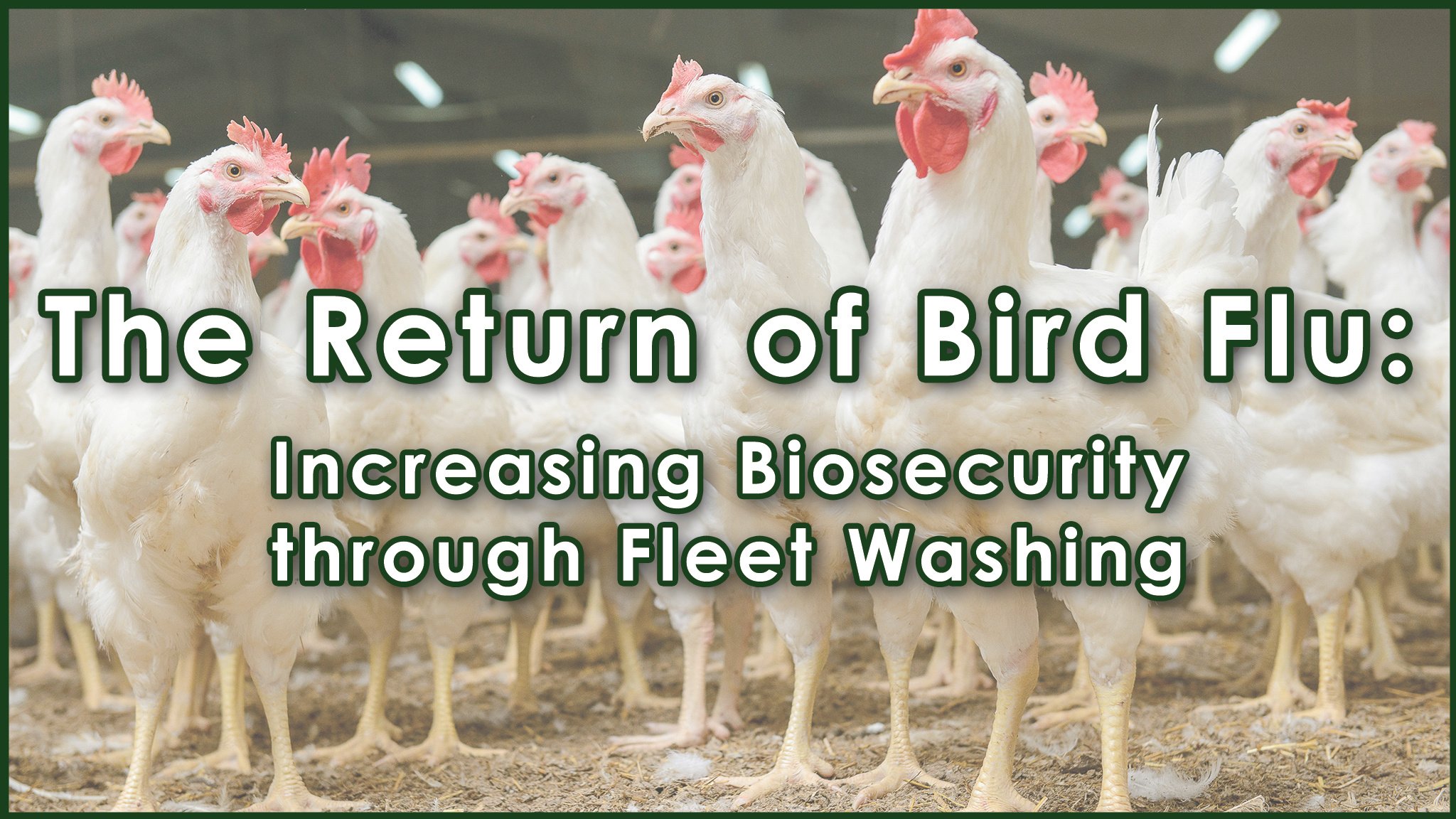The Return of Bird Flu: Increasing Biosecurity through Fleet Washing

On Feb. 14, a flock of about 240,000 chickens owned by Tyson Foods Inc. in Kentucky tested positive for a highly lethal form of bird flu — the H5N1 strain. This is part of a widening outbreak that threatens the entire U.S. poultry industry.
Back in 2015, millions of chickens were killed as a bird flu outbreak ravaged the industry. Farmers needed to ensure everyone, including fleets that delivered birds and feed, were thoroughly cleaned and disinfected before entering. Now, as The United States Department of Agriculture (USDA) confirms several positive H5N1 cases in wild birds, and some commercial and backyard flocks, in multiple states including New York, Indiana, and Virginia, there is increasing pressure to deliver a higher standard of care when it comes to fleet washing. Here’s what you need to know.
How this Affects the Fleet Washing Industry
As officials confirm additional cases of H5N1 in birds across the country, it’s important to note that birds can be infected without appearing sick. Anyone involved with poultry — commercial or backyard flocks — should review and enhance their biosecurity practices.
This includes any transportation used on-site at facilities, including everything from personal vehicles to feed trucks and poultry transport trailers. The washing, disinfecting, and drying of transportation vehicles that travel between feed mills, processing plants, buying stations, or other farms is a critical biosecurity step in disease prevention.
Poultry producers know the risk of transmission within a facility for bird flu increases during the winter months, and cross-contamination between facilities greatly increases once wild flocks start to migrate north again. Biosecurity procedures are the first line of defense. Transport vehicles are a possible source of transmission to farms and processing plants, which means guidelines for cleaning need to be strictly enforced. Proper cleaning of trucks and trailers is necessary to maximize the level of protection from disease.
What You Should Know About the Flu
Highly Pathogenic Avian influenza (HPAI), commonly known as bird flu, is caused by influenza type A virus which can infect wild birds such as ducks, pheasants, quails, geese, shorebirds, and guinea fowl. It can also infect poultry including chickens and turkeys.
The CDC says wild birds can transmit bird flu to each other or to poultry through direct contact or through their feathers, feces, and saliva on surfaces such as cages, tractors, and other farm equipment. Wild birds can carry the disease to new areas when migrating, according to the USDA.
After a farm-raised bird is infected, the virus can spread easily and quickly among hundreds, or even thousands of other birds, according to the University of Michigan Health. All birds, sick or not, located within the hot zone must be euthanized in very short order to stop the virus from spreading.Why a Biosecurity Wash System is Essential
Bird flu has the ability to devastate the poultry industry, regardless of whether a facility is directly impacted by positive cases. In a report from the USDA, it was shown that “disease events can impact related industries even if the disease has no direct effect.” This places a soaring demand on implementing superior protection measures.
Poultry farmers depend on transportation vehicles to be thoroughly cleaned and disinfected against what could be an extremely expensive loss. Transportation fleets that don’t follow a stringent cleaning process could play a direct role in furthering the bird flu outbreak, leading to trade restrictions and loss of income across all facilities. Proper biosecurity systems in place help prevent the spread of disease and shorten the length of time disease is spread.
In 2014-2015, the U.S. poultry industry was heavily impacted by a bird flu outbreak. It was a “historic animal-disease event” resulting in over 50 million birds being destroyed and trade restrictions on U.S. poultry exports. The USDA stated then that even if the industry was able to recover quickly from production losses, “other market impacts — such as trade losses and price instability — can persist.”
Why Work with Hydro-Chem Systems to Design and Implement an Effective Biosecurity Wash System
Hydro-Chem Systems has been a leader in the automated biosecurity truck wash industry for years. We understand how important it is that an entire vehicle is cleaned and sanitized, including the undercarriage, wheels, chassis, tractor, and trailer.
We developed systems that are custom-designed for each facility to help prevent disease transmission, including simple options that apply only a sanitizer. Typically, our biosecurity wash systems will wash the vehicle to ensure a clean surface to which an EPA-approved sanitizer is applied to the entire vehicle, including the undercarriage and wheels. And all of our full washes are designed to clean every vehicle that may drive from farm to farm, including feed trucks, poultry haulers, hog haulers, fuel trucks, dump trucks, and personal vehicles.
About Hydro-Chem Systems
Hydro-Chem Systems is a leading supplier of fleet and industrial truck cleaning solutions. For more than 50 years, we’ve dedicated ourselves to helping private fleet owners, municipalities, schools, farms, manufacturers, and mobile washers across the USA & Canada achieve the lowest cost per wash. To find more information on how you can clean more vehicles in less time, call 616-531-6420 or email us at info@hcsclean.com
